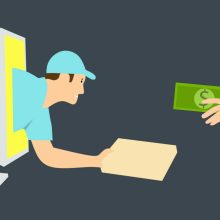Shares|ShareTweet Enterprising homesteaders looking to turn that passion into profit must read these 10 profitable side hustles to help earn them extra cash. With some creativity and a little bit of hard work, your small homestead can provide more than just fresh produce, eggs and a simpler lifestyle- it can also produce a consistent flow of money. According to the USDA, small farms with gross cash farm income under $350,000 account for 89% of all U.S. farms. Many of these small farms are finding innovative ways to diversify their income streams. Here are 10 ways to earn an extra $1,000-$1500…
Mortgage Rates: Factors that Affect Mortgage Rates

How to Compare Rates, and Tips for Getting the Best Mortgage Rate
As a potential homebuyer or homeowner, understanding mortgage rates is crucial. Mortgage rates are the interest rates that you pay on your mortgage, and they can have a significant impact on your monthly payments and overall financial well-being. In this article, we’ll discuss the factors that affect mortgage rates, how to compare rates, and tips for getting the best mortgage rate possible.
Factors that Affect Mortgage Rates
Several factors affect mortgage rates, including:
Economic Factors
Economic factors such as inflation, the state of the economy, and the Federal Reserve’s monetary policy can affect mortgage rates. For example, when the economy is doing well, inflation tends to increase, and the Federal Reserve may increase interest rates to combat inflation. When interest rates rise, mortgage rates tend to rise as well.
Credit Score
Your credit score is one of the most important factors that lenders consider when determining your mortgage rate. Borrowers with higher credit scores generally receive lower mortgage rates because they’re considered less risky to lenders. On the other hand, borrowers with lower credit scores may receive higher mortgage rates because they’re considered higher risk.
Loan-to-Value Ratio
The loan-to-value (LTV) ratio is the amount of your mortgage divided by the value of your property. The higher your LTV ratio, the higher your mortgage rate is likely to be. Lenders consider borrowers with higher LTV ratios riskier because they have less equity in their homes.
Loan Type
The type of mortgage you choose can also affect your mortgage rate. For example, fixed-rate mortgages tend to have higher interest rates than adjustable-rate mortgages (ARMs) because they offer more stability to borrowers. ARMs, on the other hand, can offer lower initial interest rates, but they can be more unpredictable over the life of the loan.
How to Compare Mortgage Rates
When comparing mortgage rates, it’s important to consider the following factors:
APR
The annual percentage rate (APR) is the total cost of the loan, including the interest rate, points, and other fees. The APR can be a more accurate representation of the true cost of the loan than the interest rate alone.
Loan Term
The loan term is the length of time you have to pay off your mortgage. Longer loan terms typically result in lower monthly payments but higher overall interest costs.
Fees
Mortgage fees can include origination fees, application fees, appraisal fees, and closing costs. When comparing mortgage rates, it’s essential to consider the fees associated with each loan to ensure that you’re getting the best deal possible.
Tips for Getting the Best Mortgage Rate
Shop Around
One of the best ways to get the best mortgage rate is to shop around and compare rates from multiple lenders. According to a study by Freddie Mac, borrowers who get multiple quotes save an average of $1,500 over the life of the loan.
Improve Your Credit Score
Improving your credit score can help you get a lower mortgage rate. According to a study by LendingTree, borrowers with excellent credit scores can save up to 1.25% on their mortgage rates compared to borrowers with fair credit scores.
Consider Different Loan Types
Choosing the right loan type can also help you get a better mortgage rate. For example, if you plan on staying in your home for a long time, a fixed-rate mortgage may be a better option than an adjustable-rate mortgage.
Choose a Shorter Loan Term
Choosing a shorter loan term, such as a 15-year mortgage, can result in lower mortgage rates because lenders consider these loans less risky. While the monthly payments may be higher, you’ll save money in interest over the life of the loan.
Make a Larger Down Payment
Making a larger down payment can also help you get a better mortgage rate. Lenders typically offer lower rates to borrowers who have more equity in their homes because they’re considered less risky.
Consider Paying Points
Paying points upfront can also lower your mortgage rate. Points are fees paid to the lender at closing in exchange for a lower interest rate. While paying points can be expensive upfront, it can save you money over the life of the loan if you plan on staying in your home for a long time.
Expert Opinions and Studies
According to a recent study by the Consumer Financial Protection Bureau, borrowers who don’t shop around for a mortgage may be leaving money on the table. The study found that borrowers who obtained just one quote paid an average of $300 more per year than those who obtained multiple quotes.
Additionally, a study by the Urban Institute found that borrowers with lower credit scores are more likely to default on their mortgages, leading to higher costs for lenders. As a result, borrowers with lower credit scores may be charged higher interest rates.
Furthermore, the Mortgage Bankers Association reports that the average mortgage rate for a 30-year fixed-rate mortgage was 3.07% in 2020. However, rates can vary widely depending on factors such as credit score, loan term, and loan type.
FAQs
What is the difference between the interest rate and the APR?
The interest rate is the rate at which you’ll pay interest on your mortgage loan. The APR, on the other hand, includes the interest rate as well as other fees associated with the loan, such as origination fees and closing costs.
Should I choose a fixed-rate or adjustable-rate mortgage?
The choice between a fixed-rate or adjustable-rate mortgage depends on your individual circumstances. Fixed-rate mortgages offer more stability but can come with higher interest rates. Adjustable-rate mortgages can offer lower initial interest rates but can be more unpredictable over the life of the loan.
How can I improve my credit score?
Improving your credit score can take time, but some tips include paying your bills on time, paying down debt, and avoiding opening too many new credit accounts.
Conclusion
In conclusion, mortgage rates are affected by various factors such as economic conditions, credit scores, loan-to-value ratios, and loan types. When comparing rates, it’s important to consider the APR, loan term, and fees associated with each loan. To get the best mortgage rate, it’s essential to shop around, improve your credit score, consider different loan types, choose a shorter loan term, make a larger down payment, and consider paying points. With these tips in mind, you can find the best mortgage rate possible and save money over the life of your loan.
Types of Mortgages: Exploring the Options Available in the Market








